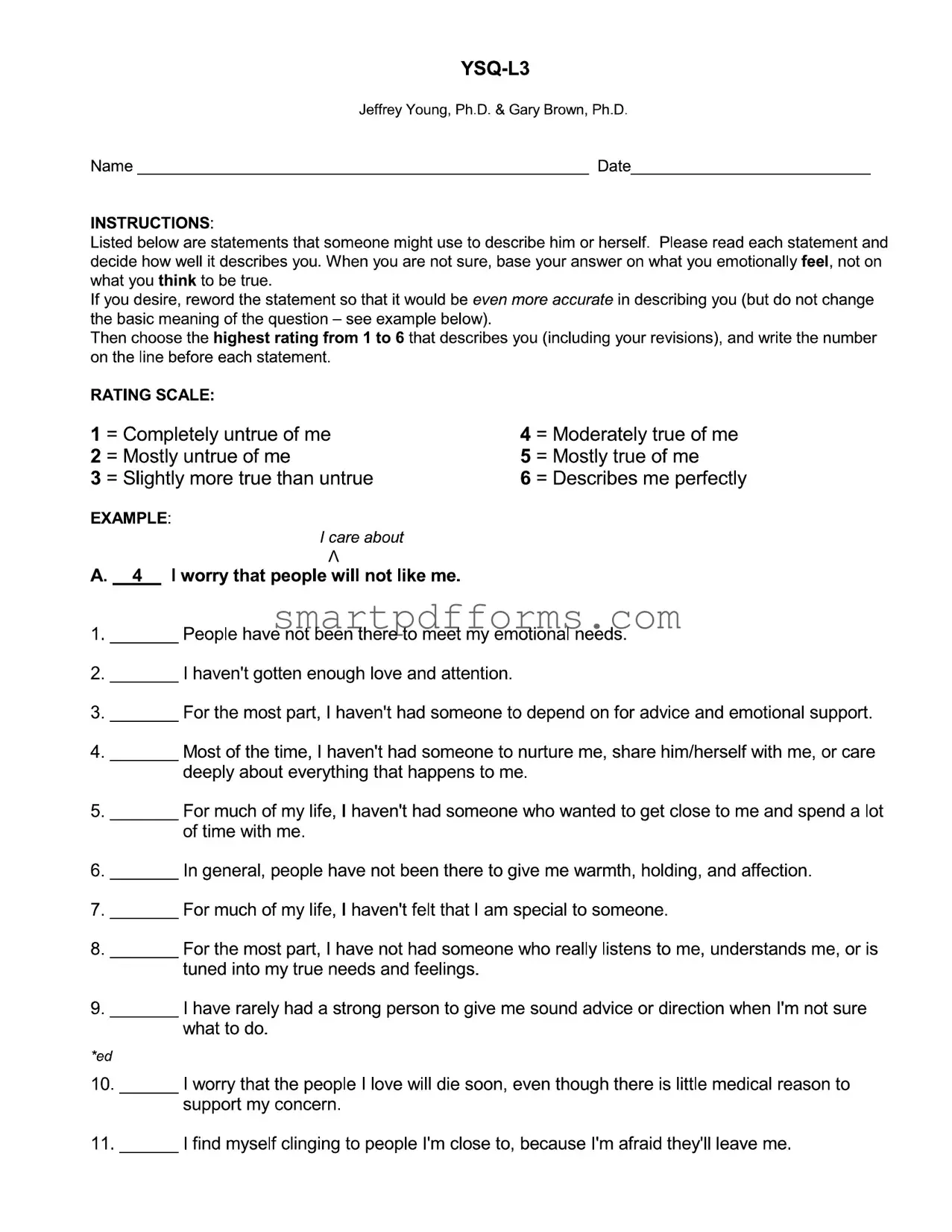Blank Ysq L3 PDF Template
The YSQ-L3 form, developed by Jeffrey Young, Ph.D., and Gary Brown, Ph.D., serves as a tool to introspectively assess one's emotional beliefs and patterns. It presents a series of statements that individuals are encouraged to read and then rate based on how well these reflections mirror their own perceptions and emotional experiences. The aim is to encourage individuals to focus on their feelings, rather than their rationalizations, to provide the most accurate self-assessment. With a rating scale that ranges from 1 (completely untrue of me) to 6 (describes me perfectly), the form facilitates an exploration of one's emotional needs, fears of abandonment, difficulties in trust, feelings of defectiveness, and social isolation, among other issues. This detailed approach not only aids participants in understanding their emotional responses but also in recognizing recurring patterns that might affect their relationships and overall well-being. Additionally, by allowing revisions to make statements more personally accurate without changing their essential meaning, the YSQ-L3 form offers a customized introspection process tailored to each individual's unique emotional landscape.
Preview - Ysq L3 Form
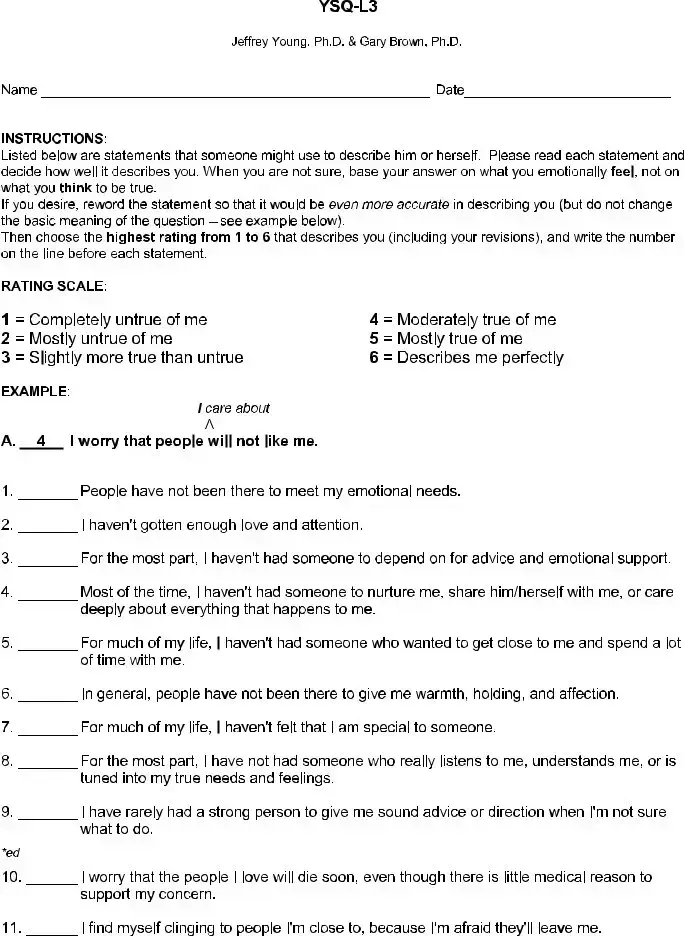
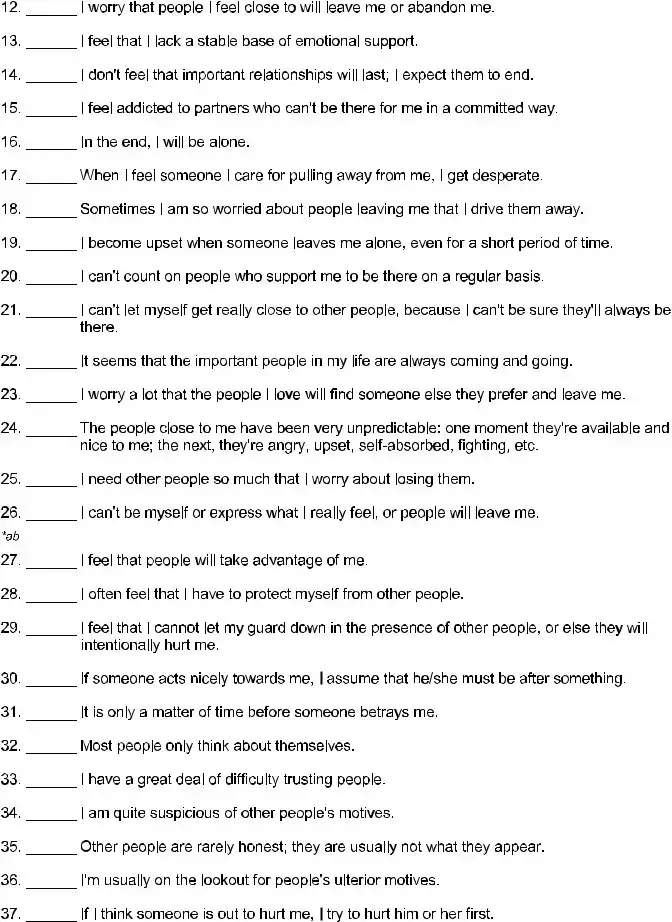
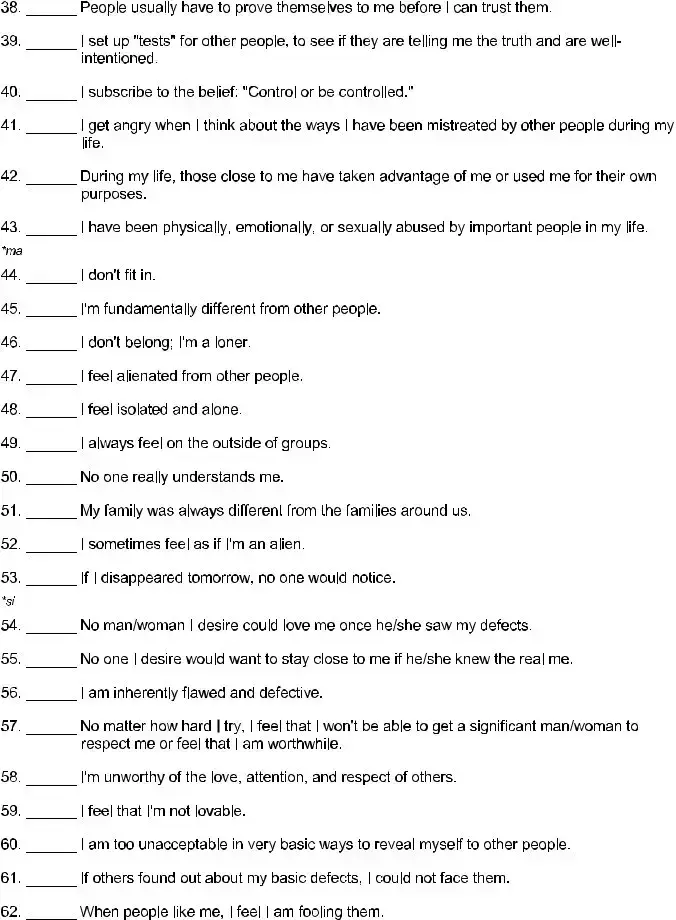
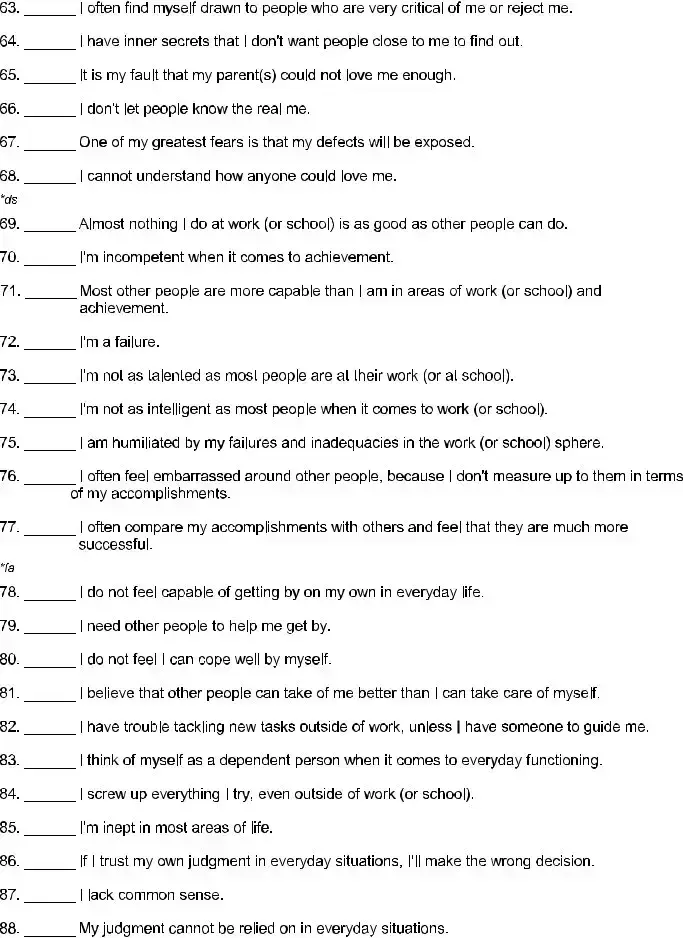
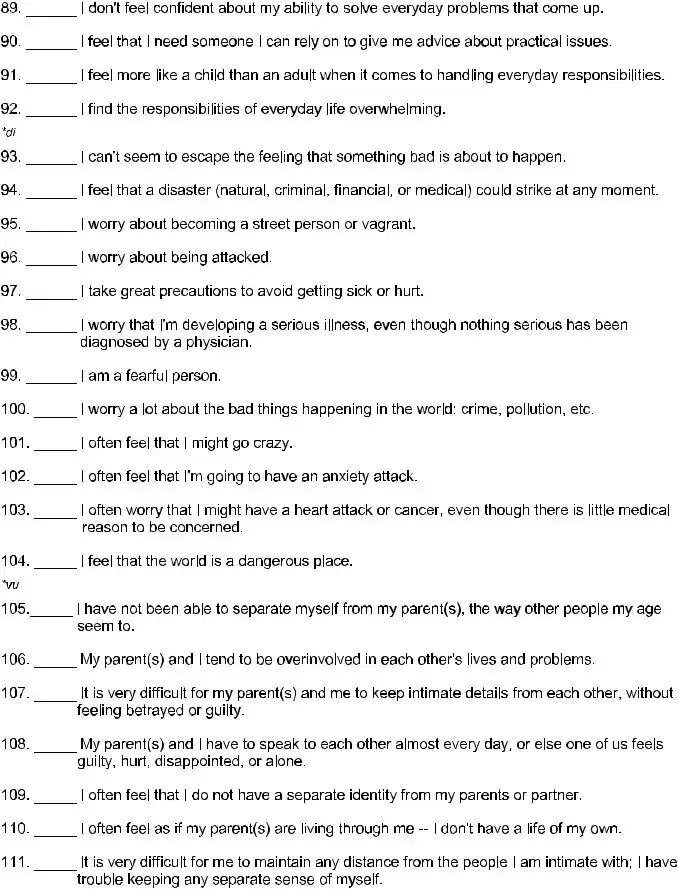
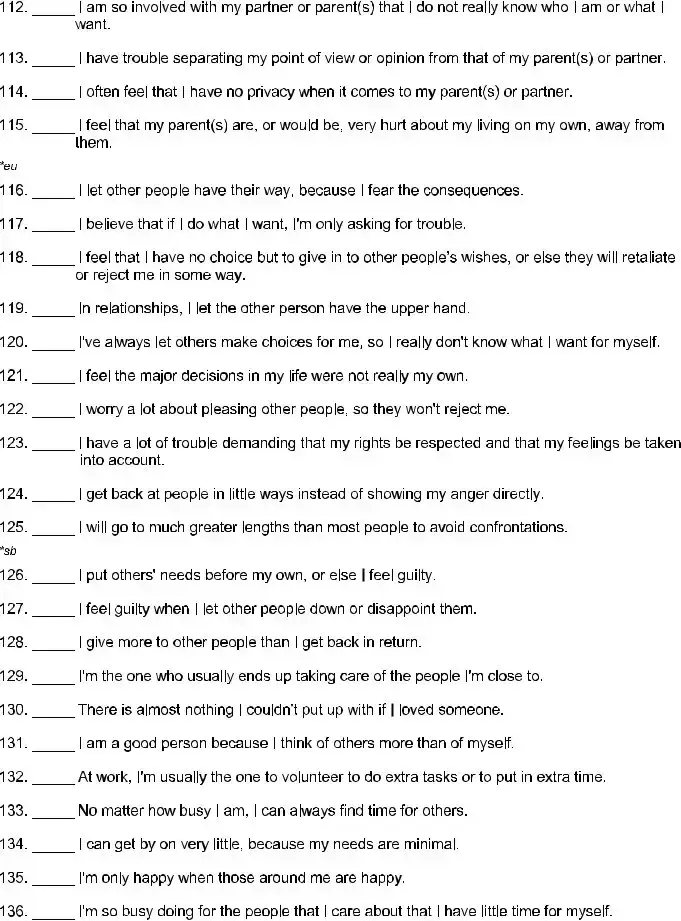
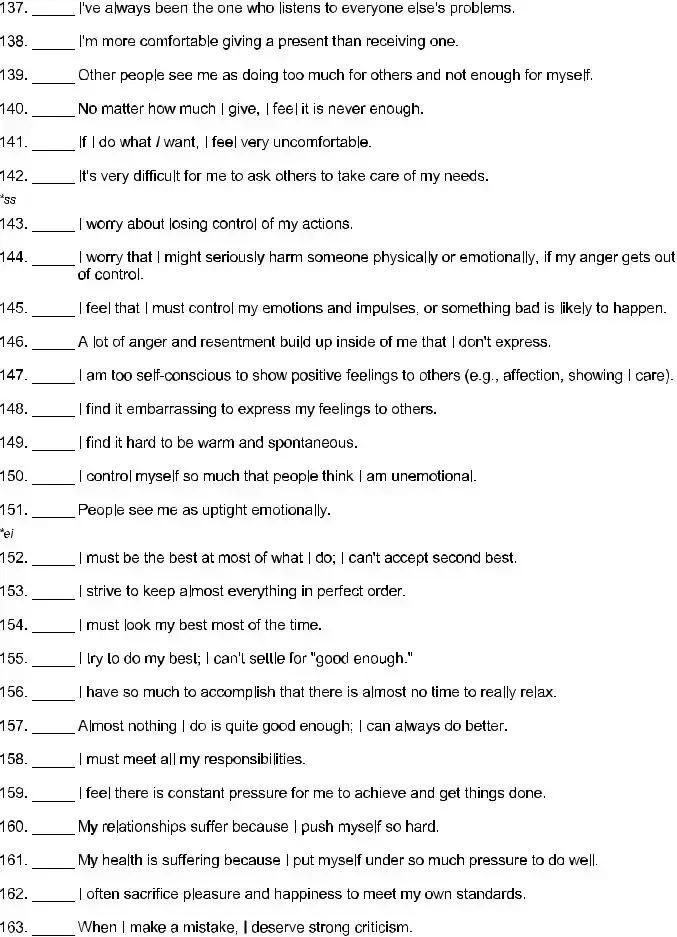
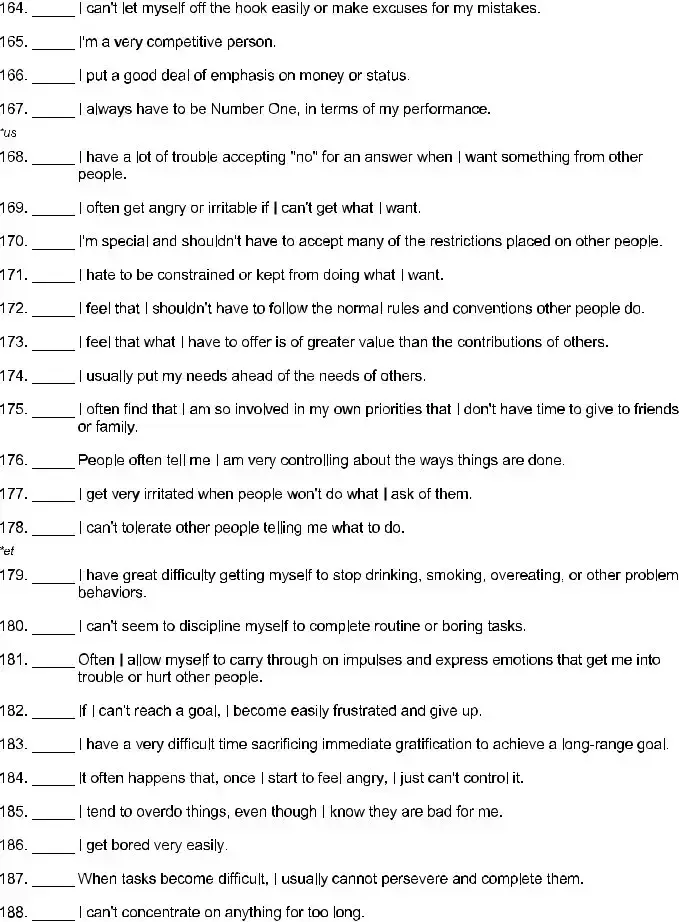
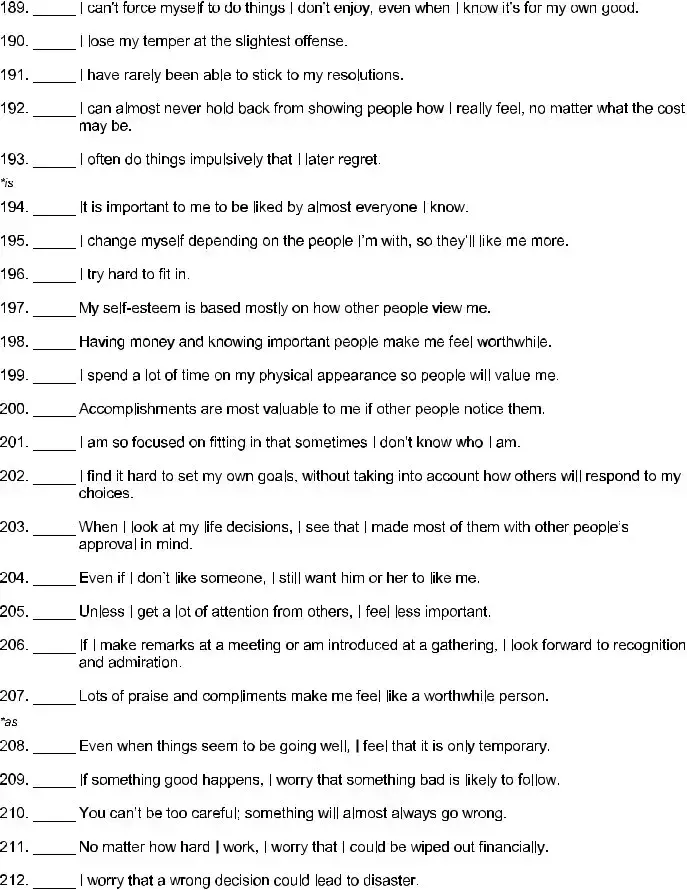
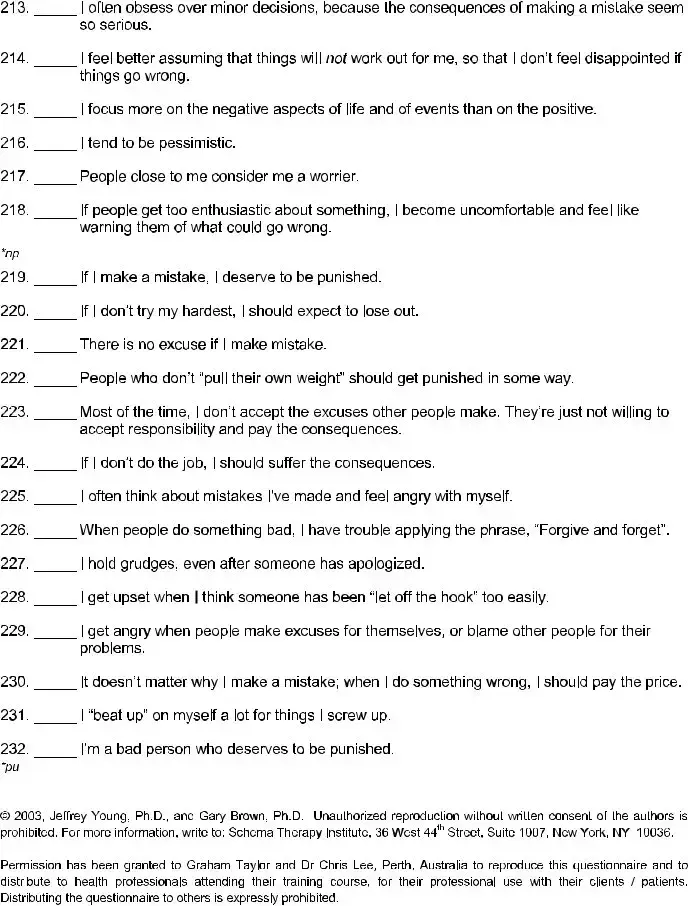
Form Data
| Fact Name | Detail |
|---|---|
| Form Title | YSQ-L3 |
| Creators | Jeffrey Young, Ph.D. & Gary Brown, Ph.D. |
| Purpose | To help individuals identify underlying beliefs that might be causing emotional distress. |
| Methodology | Users rate statements on a scale of 1 to 6 based on how well these statements describe their feelings and experiences. |
Instructions on Utilizing Ysq L3
Filling out the YSQ-L3 form, designed by Jeffrey Young, Ph.D., and Gary Brown, Ph.D., is a straightforward process that requires honest self-assessment. It's designed to reflect various aspects of your emotional well-being and how you see yourself in relation to others and the world. The form presents a series of statements that you might or might not feel represent you. It's important to remember while filling out the form that your responses should be based on your instinctual feelings rather than overthinking the statements. Below are step-by-step instructions to guide you through completing the form accurately.
- Read through the initial instructions thoroughly to understand the purpose of the form and how to approach the statements.
- Start with the first statement. Take a moment to consider how accurately it describes you. Remember, focus on your immediate emotional response rather than rational analysis.
- If you feel the statement could be more accurate with slight modifications without changing its essential meaning, make those changes mentally or note them down.
- Refer to the rating scale provided at the top of the form. Decide which number from 1 to 6 best represents how true the statement is for you, with 1 being "Completely untrue of me" and 6 being "Describes me perfectly."
- Write your chosen number on the line before the statement. This quantifies how well the statement applies to you.
- Move on to the next statement and repeat the process. It's crucial to consider each statement independently and avoid rushing through the responses.
- Continue this process for all 60 statements. Ensure you don't skip any statements. If you're unsure about how well a statement describes you, lean on how you feel emotionally rather than what seems logically correct.
- After completing all the statements, review your answers. Since your emotional responses can vary, it's important to ensure that your responses still feel accurate upon reflection. Make any adjustments if necessary.
- Once you're satisfied with your responses, finalize the form. Your completion of this form is a step towards understanding your emotional patterns and self-perception better.
After filling out the YSQ-L3 form, the next steps typically involve discussing your responses with a qualified professional who can help you analyze the results. This discussion aims to provide insights into your emotional needs, fears, and the underlying patterns that may influence your behavior and relationships. It’s a valuable opportunity to understand yourself deeper and to explore ways to achieve greater emotional well-being.
Obtain Answers on Ysq L3
What is the YSQ-L3 form?
The YSQ-L3 form, or Young Schema Questionnaire – Long Form 3, is a psychological tool developed by Jeffrey Young, Ph.D., and Gary Brown, Ph.D. It is designed to help individuals identify their underlying schema or core beliefs that might be contributing to distressing patterns in their lives. This self-assessment questionnaire includes statements that a person may use to describe themselves, asking them to rate how well each statement applies, thereby helping to uncover emotional needs, fears, and patterns.
How do you complete the YSQ-L3 form?
Completing the YSQ-L3 form involves reading each statement carefully and deciding how well it describes you, including emotional reactions rather than solely rational thoughts. The form uses a rating scale from 1 to 6, where 1 means the statement is completely untrue for you, and 6 means it describes you perfectly. Participants are encouraged to answer based on their feelings and are allowed to slightly reword a statement to make it more accurately reflect their personal experiences, as long as the base meaning does not change.
What is the purpose of the rating scale?
The rating scale on the YSQ-L3 form serves to quantify the degree to which each statement applies to an individual. It ranges from 1, signifying complete disagreement or inapplicability, to 6, indicating complete agreement or applicability. This scale allows individuals to assess how strongly they identify with various core beliefs or schemas, aiding in the identification of patterns that may be affecting their mental health and relationships.
Can I change the wording of statements on the YSQ-L3 form?
Yes, the instructions for the YSQ-L3 form explicitly allow individuals to reword statements to better describe their experience, provided these modifications do not alter the fundamental meaning of the statements. This flexibility helps ensure that the questionnaire accurately captures the responder's schemas, making the results more personally relevant and insightful.
What should you do if you're unsure about how a statement applies to you?
If you're unsure about a statement, it's recommended to base your answer on what you emotionally feel rather than what you think to be true. The YSQ-L3 form focuses on capturing emotional responses and patterns, which means your initial, gut reaction is often more aligned with the underlying schemas the questionnaire aims to uncover.
What happens after completing the YSQ-L3 form?
After completing the YSQ-L3 form, the responses are typically reviewed by a mental health professional who can help interpret the results. This discussion can provide valuable insights into your emotional needs, fears, and patterns. It can also be a starting point for therapeutic work aimed at addressing and transforming maladaptive schemas into healthier beliefs and behaviors.
Is the YSQ-L3 form used for self-diagnosis?
No, the YSQ-L3 form is not intended for self-diagnosis. While it can offer significant insights into your emotional world and behavioral patterns, interpreting the results accurately and developing a plan to address any identified issues typically requires professional psychological expertise. It is a tool designed to facilitate self-understanding and therapeutic progress rather than to provide a diagnosis.
Common mistakes
Filling out the YSQ-L3 form, which delves into personal emotional assessments, can be a nuanced process. However, a number of common mistakes might lead to inaccurate reflections or misinterpretations of one's emotional state. Recognizing these errors can significantly improve the effectiveness and accuracy of this self-assessment tool.
Not basing answers on emotional feelings: Many individuals tend to rely on their rational thoughts rather than focusing on how they emotionally feel, which may lead to responses that don't genuinely reflect their emotional experiences.
Overthinking the questions: Analysis paralysis can creep in, causing some to overanalyze each statement. This might skew the response away from an accurate emotional self-assessment.
Changing the basic meaning of the statement: In the effort to make a statement more accurately describe their experience, some might alter its fundamental meaning, thus deviating from the assessment's intent.
Rushing through the questionnaire: Hurrying through the statements without taking the time to reflect may result in answers that are not true to one's actual feelings and experiences.
Choosing a rating based on exceptions rather than the rule: Some may select a rating based on a few exceptional situations instead of what is generally true for them, leading to inaccurate responses.
Allowing recent events to overly influence answers: Recent emotional experiences might disproportionately influence responses, overshadowing a more balanced, long-term view of one's emotional patterns.
Failure to revise statements for accuracy: While the instructions permit minor revisions to further align statements with personal experiences, failing to utilize this opportunity can result in less accurate responses.
Not considering the full range of the rating scale: Some might limit their answers to the middle range of the rating scale, neglecting to use the full spectrum, which can lead to a compressed and less nuanced view of their emotional selves.
Recognizing and avoiding these common mistakes when completing the YSQ-L3 form can lead to a more accurate and insightful self-assessment, helping individuals better understand their emotional responses and patterns.
Documents used along the form
When working with the YSQ-L3 form, developed by Jeffrey Young, Ph.D., & Gary Brown, Ph.D., professionals delve into understanding a person's emotional beliefs and patterns that may be impacting their current behavior and emotional well-being. The YSQ-L3 is a powerful tool in psychotherapy, especially in approaches focusing on Schema Therapy. However, to get a full picture of an individual's psychological landscape, other forms and documents are often utilized alongside the YSQ-L3. Each of these documents serves a unique purpose, providing complementary insights that, when combined, furnish a more complete understanding of an individual's mental health. Here are some commonly used forms and documents:
- Beck Depression Inventory (BDI): A 21-question multiple-choice self-report inventory, widely used to measure the severity of depression.
- Beck Anxiety Inventory (BAI): Similar to the BDI, the BAI is a 21-question multiple-choice form that assesses the severity of a person's anxiety.
- Minnesota Multiphasic Personality Inventory (MMPI): A comprehensive psychometric tool designed to assess various psychological conditions and personality structure. It's one of the most extensively used and researched clinical assessment tools.
- Dialectical Behavior Therapy Skills Use Form: A tracking form used by individuals in Dialectical Behavior Therapy (DBT) to monitor their use of DBT skills, helping in the treatment of difficult emotional and interpersonal problems.
- Health and Daily Functioning Questionnaire: This form captures information about an individual's physical health, daily activities, and the impact of any health issues on their daily functioning.
- Family History and Dynamics Form: A form used to gather detailed information about a person's family history and relationships, providing context for understanding current relational and emotional patterns.
- Trauma History Questionnaire: A comprehensive form designed to screen for a history of trauma, including physical, emotional, and sexual abuse, as well as significant losses.
- Substance Use and Addiction History Form: This document helps clinicians gauge the extent of a person's substance use and its impact on their life, crucial for creating an effective treatment plan.
- Coping Strategies Inventory: This inventory assesses the strategies an individual uses to cope with stress, highlighting adaptive and maladaptive coping mechanisms.
- Client Satisfaction Questionnaire: Used to measure a client’s satisfaction with the services provided, offering valuable feedback for clinicians to improve their practice.
Together, these forms and documents create a comprehensive toolkit that helps clinicians develop a thorough and nuanced understanding of their clients. Employing these tools in conjunction with the YSQ-L3 allows for a multidimensional assessment of emotional health, ensuring that the chosen therapeutic interventions are well-targeted and effective. Thus, each document not only complements the YSQ-L3 form but also enriches the overall therapeutic process, facilitating greater insight, growth, and healing for the individuals seeking help.
Similar forms
The Beck Depression Inventory (BDI): Similar to the YSQ-L3, the Beck Depression Inventory assesses individuals' emotional and cognitive symptoms of depression. Both instruments ask respondents to rate their feelings and thoughts over a recent time period, providing insights into their mental state.
The Myers-Briggs Type Indicator (MBTI): This personality assessment shares similarities with the YSQ-L3 in how it asks individuals to reflect on their usual patterns of behavior, feeling, and thinking. While the MBTI categorizes personalities into 16 types, the YSQ-L3 focuses more on emotional schemas and beliefs about oneself.
The Generalized Anxiety Disorder 7 (GAD-7): The GAD-7, like the YSQ-L3, is a self-reported questionnaire used to identify probable cases of a specific disorder, in this case, generalized anxiety disorder. Both forms present statements that respondents rate based on their recent experience.
The Rosenberg Self-Esteem Scale: This tool measures self-esteem using a scale of statements that respondents agree or disagree with, similar to the YSQ-L3's method of asking individuals to rate statements based on how well they describe their feelings and beliefs.
The Attachment Style Questionnaire (ASQ): Resembling the YSQ-L3, the ASQ assesses individuals' attachment styles in relationships. It examines how securely or insecurely people view their relationships with significant others through a series of descriptive statements that participants rate.
Dos and Don'ts
When filling out the YSQ L3 form, it's important to approach the task thoughtfully and carefully. Below are some recommended dos and don'ts to help guide you through the process efficiently and accurately.
Do:- Read every statement thoroughly. Understanding each statement completely is crucial before you decide how well it applies to you.
- Trust your emotions. If you're unsure about a statement, lean on your emotional response rather than overthinking your answer.
- Feel free to reword statements. Modifying the wording to better match your experiences is allowed, but keep the original meaning intact.
- Choose the highest rating that applies. Even after rewording a statement, pick the rating that best describes you, including your revisions.
- Take your time. Don't rush through the questionnaire. Give yourself time to reflect on each statement accurately.
- Answer honestly. The form is a tool for self-assessment, so being as honest as possible will provide the most benefit.
- Review your responses. Once you've completed the form, go back and review your answers to ensure they accurately reflect how you feel.
- Rush through the form. Hurrying can lead to less accurate responses, which could impact the usefulness of the exercise.
- Overthink your answers. While it's important to be thoughtful, overanalyzing each statement can be counterproductive. Trust your initial instinct.
- Ignore your emotional responses. These responses are key to understanding how well each statement applies to you.
- Change the basic meaning of statements. While rewording for clarity or better fit is encouraged, altering the fundamental meaning of a statement is not.
- Focus too much on what others might think. This form is for your personal reflection, so focus on your own feelings and experiences.
- Worry about "right" or "wrong" answers. There are no correct or incorrect responses; the aim is to accurately represent your feelings and experiences.
- Let others influence your responses. This self-assessment should be completed independently to ensure that the responses are uniquely yours.
Misconceptions
Understanding the YSQ-L3 form is crucial, but there are several misconceptions that often cloud its true purpose and how it should be used. Here's a breakdown of seven common misunderstandings:
It's only for people with severe psychological issues. The YSQ-L3 is a tool designed to help any individual gain insight into their emotional patterns, not just those with severe mental health conditions. It's about understanding oneself better, not diagnosing.
The higher the score, the worse off you are. Scoring high on certain scales of the YSQ-L3 does not mean someone is "worse" than others. It indicates areas where their emotional needs might not have been met, guiding where they may want to focus on understanding themselves better and healing.
Your answers are set in stone. Feelings and self-perceptions change over time. Responses on the YSQ-L3 can vary at different points in someone's life, reflecting personal growth or changes in circumstances.
It's a self-help tool that fixes problems. While the YSQ-L3 can offer profound insights into one's emotional world, it's not a cure or solution by itself. It often works best alongside therapeutic guidance.
You need to have experienced trauma to benefit from it. This form is useful for a wide range of people, not just those who have experienced trauma. It explores broader patterns of emotional need and schema formation that are applicable to everyone.
Results are private and can't be shared with a therapist. Sharing your insights from the YSQ-L3 with a therapist can be incredibly beneficial. This shared understanding can enhance your therapeutic journey and help tailor the approach to your needs.
It categorizes you as having specific disorders. The YSQ-L3 is about identifying schemas that might be unhelpful or distressing—it doesn't diagnose any individual with mental health disorders. Instead, it offers a starting point for personal reflection and growth.
Clarifying these misconceptions opens the door to utilizing the YSQ-L3 form as a powerful tool in personal development and therapy. By understanding what the form does and does not do, individuals can approach their results with a constructive perspective, using insights gained to foster personal growth and wellbeing.
Key takeaways
Filling out and using the YSQ-L3 form, designed by Jeffrey Young, Ph.D. & Gary Brown, Ph.D., can be crucial for individuals seeking to understand their emotional patterns more deeply. Here are some key takeaways:
- The YSQ-L3 form is a tool designed to help individuals identify and reflect upon underlying beliefs and patterns that might be influencing their emotional wellbeing.
- It contains statements that a person may use to describe themselves, requiring the individual to rate how well each statement reflects their feelings on a scale from 1 to 6.
- Respondents are encouraged to focus on their emotional responses rather than intellectual analysis when selecting their ratings, ensuring a more accurate reflection of their internal state.
- If a statement doesn't perfectly align with the individual's feelings, they are allowed to reword it, as long as the fundamental meaning remains unchanged. This flexibility helps tailor the assessment to more closely fit personal experiences.
- The numerical rating scale ranges from 1, indicating complete disagreement with the statement, to 6, representing perfect alignment. This scale is designed to capture the nuanced spectrum of personal agreement or resonance with each statement.
- Given the sensitive nature of the statements, which explore themes such as trust, abandonment, and self-perception, participants are reminded to approach the questionnaire with honesty and openness.
- The form serves not only as a diagnostic tool but also as a stepping stone for therapeutic discussions, either with a clinician or for self-reflection, to help address identified issues.
- Upon completion, reviewing the patterns in responses can reveal significant insights into one's emotional schemas, potentially highlighting areas for personal growth or therapeutic focus.
Ultimately, the YSQ-L3 form is a valuable resource for those looking to delve deeper into their emotional and interpersonal dynamics, providing a structured way to uncover and begin addressing complex emotional schemas.
Popular PDF Forms
Do Brides Pay for Bridesmaids Hair and Makeup - This Bridal Makeup Contract by Priscilla Chakmakian ensures all your wedding day makeup needs are clearly agreed upon, including services for the entire bridal party.
Philhealth Registration Online - Including your mother's maiden name is a requirement, offering an additional layer of identity verification.
